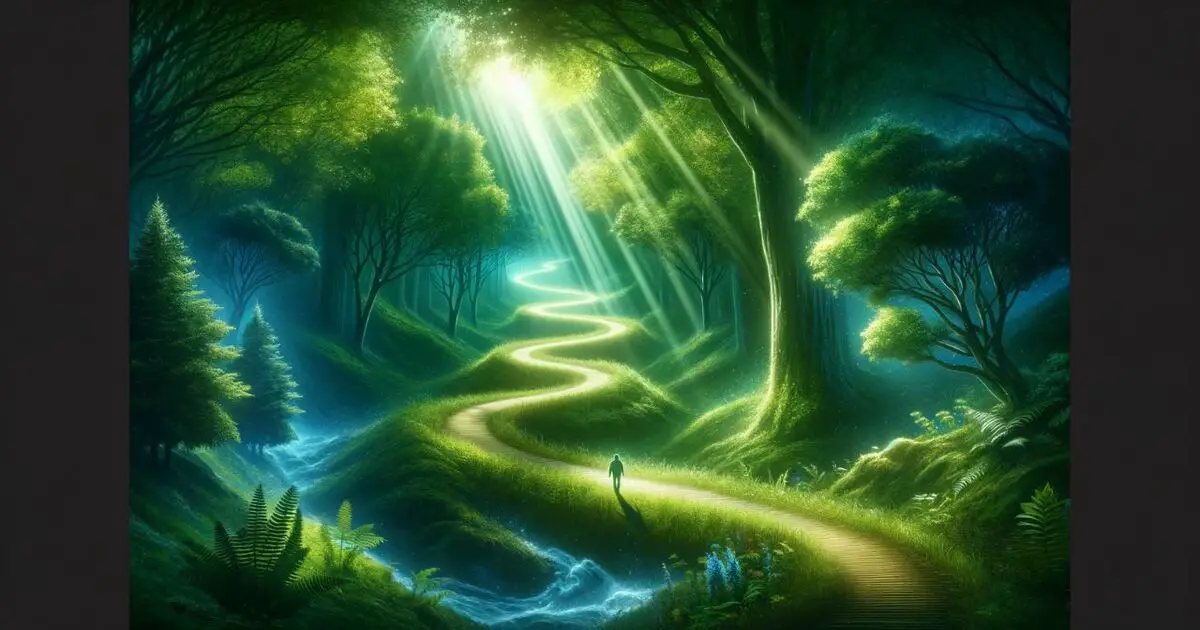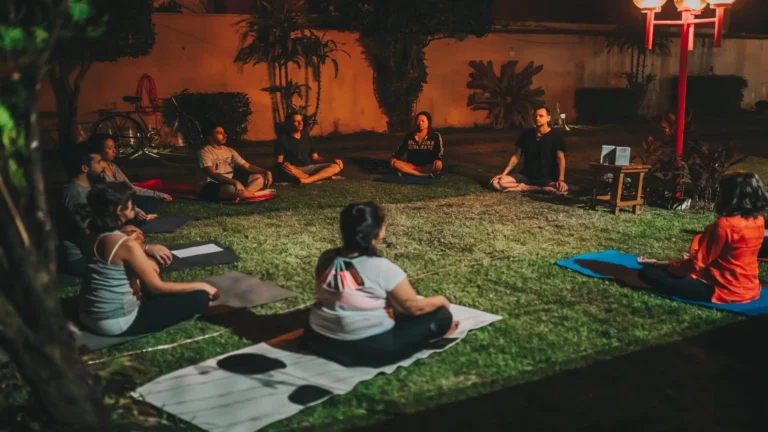How to Find Your True Self in Our Crazy World In 2024

Who are we beneath all the noise and expectations? We often lose sight of ourselves while trying to fit in or meet unrealistic standards. Over time, we adopt habits and behaviors that mask our true selves, putting on different versions just to get by.
These layers lead to disconnection, from others and ourselves. It’s exhausting and wears us down.
But we can find our way back. For me, it was about peeling back those layers, embracing vulnerability, and making choices that felt true.
This journey takes courage, and it’s not always easy. But the rewards, freedom, joy, and a sense of wholeness, make it all worthwhile.
Key Takeaways
Dr. Gabor Maté often talks about how our chaotic world disconnects us from ourselves. For more insights, explore the Law of Correspondence, which can help us understand this disconnection on a deeper level. And he’s right.
This disconnection is at the root of so many struggles, addiction, depression, anxiety, and even physical illnesses like autoimmune disorders. But if we’re willing to listen, even our wounds can guide us back to who we truly are.
It’s all about learning to say no to what’s not authentic. Tune in to what our souls are whispering to us. Journaling prompts to find your true self can be helpful in this process.

Finding Our True Selves
From the moment we’re born, life throws challenges our way. Trauma, whether big or small, shapes us. And in response, we develop coping mechanisms to protect ourselves.
These behaviors might have been necessary once, but they often hide who we truly are. Understanding the Law of Polarity can help us see how opposites, like true and false selves, exist within us.
True self vs false self-psychology helps explain these behaviors and how they impact our growth.
Think about it. Sensitive souls who faced criticism or neglect as kids often learn to shut down. They repress emotions like anger or sadness because expressing them doesn’t feel safe. They ignore their own needs to fit in with family or cultural expectations. Over time, we forget who we were before all the layers of protection.
We take on labels like “too sensitive” or “too selfish” if we dare to listen to ourselves. We might turn to alcohol, shopping, or endless social media scrolling to numb the discomfort.
Practicing Mindfulness Meditation can help us become more aware of these behaviors. It’s like we’re wearing masks that help us get by, but those masks keep us from feeling truly alive.
The first step to changing all this? Noticing it. Just being aware of the patterns we’ve adopted is powerful. With compassion and honesty, we can start to unravel those old stories.
These stories say we always have to be nice or that it’s selfish to say no. What if those so-called weaknesses are doorways to something deeper? If we dare to open those doors, we might find our way back to ourselves.
Subscribe to Create Higher Vibrations!
Get Inspiration and Practical advice straight to your inbox.
True Self vs False Self Psychology
True self vs false self-psychology involves understanding the distinction between our authentic self. It also examines the version of ourselves that we’ve created to cope with the world.
Our true self is the part of us that feels naturally aligned, spontaneous, and genuine. It’s who we are when we’re not trying to meet others’ expectations or protect ourselves from pain.
On the other hand, the false self is the persona we develop to adapt to our environment. It’s shaped by societal pressures, childhood experiences, and our desire to be accepted.
The false self often serves a protective purpose, helping us navigate challenging situations or avoid rejection. However, when we rely too heavily on this false self, we become disconnected from our authentic selves.
Understanding the difference between the true self vs the false self is crucial for understanding our behaviors and motivations. Many of us have spent so long living through our false selves.
We forget what it feels like to be authentic. We may feel empty, disconnected, or like something is missing. This disconnection can lead to anxiety, depression, and a general sense of dissatisfaction.
To move toward our true selves, we must identify when fear drives us. We should also notice when we act from a desire to please others. This involves becoming aware of the masks we wear and questioning whether they serve us anymore.
You might explore Visualization Meditation as a tool to visualize letting go of these masks. True healing begins when we start to let go of these masks and allow our authentic selves to shine through.
Therapies like Internal Family Systems (IFS) and Gestalt therapy can be particularly helpful on this journey. These therapy modalities for finding your true self focus on exploring different aspects of your personality.
They help us understand the roles these aspects play and integrate them to create a more authentic sense of self.
It’s about acknowledging the parts of us that have been hurt. We need to understand their protective roles. Then, we gently guide ourselves back to wholeness.

The Masks We Wear
These coping mechanisms we developed as kids often stick with us into adulthood, covering up who we truly are. Learning about Somatic Bodywork Therapy can help release these deep-seated coping patterns. I see it all the time.
People numb their loneliness with a drink. They shop when they feel empty. Others scroll through social media to avoid uncomfortable emotions. These behaviors give us temporary relief, but in the long run, they lead to self-betrayal.
Sometimes, our bodies even step in to get our attention. Migraines, back pain, anxiety attacks—these can all be signs that we’re ignoring our own needs. It’s like our bodies are waving red flags, saying, “Hey, pay attention!” And yet, we often keep pushing forward, trying to keep up with unrealistic expectations.
The truth is, we’re taught to hide our vulnerabilities. Society rewards us for appearing successful, always being “okay,” and seeming to have it all together. But when we bury our true feelings and needs, it’s no wonder we feel anxious. Many end up depressed or disconnected.
Carl Jung once said, “Until you make the unconscious conscious, it will direct your life. You will call it fate.” We must explore what’s beneath the surface. If we don’t, we will keep repeating the same patterns.
We must face our shadows. We should embrace all parts of ourselves—even the messy, uncomfortable ones. Only then do we open ourselves up to true healing.
Healing Through Authenticity
Healing starts with authenticity and the courage to be who we are, even when it’s scary. Consider Hatha Yoga for cultivating the courage and balance needed in this process. It’s about showing up for ourselves. We need to be honest about what we need. We should let go of what doesn’t serve us anymore.
We also need agency—the ability to make choices that align with our true selves. Setting boundaries, taking responsibility, and making decisions that feel right are all part of reclaiming our power.
And let’s not forget about anger. It’s often seen as a negative emotion, but it’s a powerful force for change when expressed in a healthy way. Anger can show us where our boundaries have been crossed or where we need to stand up for ourselves.
By understanding and channeling it constructively, we can create positive shifts in our lives. Exercises to connect with your true self can also support this transformation.
Finally, there’s acceptance—learning to accept ourselves, imperfections and all. Yin Yoga can be a gentle practice that helps us cultivate acceptance and inner peace.
It’s about letting go of the need to control everything and finding peace in the present moment. When we stop fighting against reality, we open ourselves up to real freedom.

Our Wounds as Teachers
Our wounds can lead us back to our true nature if we let them. There’s wisdom in the challenges we face as if nature guides us through pain toward something deeper. It’s not about suffering for the sake of suffering, but about learning from our experiences, even the tough ones.
Sometimes, it takes a crisis to wake us up. A health scare, a breakup, or a loss can make us reflect on our lives. We might ask, “Is this really what I want?” Break Free from Generational Curses to help break negative cycles that may be holding you back. They can push us to make changes that bring us closer to who we truly are.
Finding Freedom
Ultimately, the freedom to be ourselves brings joy and ends suffering. It’s not about meeting society’s expectations or striving for some impossible ideal. It’s about embracing who we are, flaws and all, and living in a way that feels true to us.
This journey isn’t easy, but it’s worth it. By peeling back the layers, we embrace our vulnerabilities. By letting go of what no longer serves us, we can live a life full of meaning. We can find joy and connection. And isn’t that what we’re all after?
So let’s take this journey together, step by step. Let’s start by being kinder to ourselves. Notice when we’re hiding or playing a role. Dare to show up as we are. Because the world needs more of that—more of us, as we truly are.
How to Find Your True Self in 6 Steps
Finding our true self is about peeling away the layers. Let’s explore some steps we can take to reconnect with who we are.
Remember, finding yourself isn’t about creating a perfect version. It’s about accepting all of who you are, imperfections included. The more honest we are with ourselves, the more freedom we find.
Final Takeaway
Finding your true self is a journey of courage, honesty, and transformation. It’s about embracing your vulnerabilities, challenging old beliefs, and reconnecting with who you genuinely are.
This journey isn’t easy, but it’s incredibly rewarding. The first step is simply showing up for yourself, just as you are.
If you’re ready to take that first step and need guidance, consider reaching out for support. Whether it’s a coach, a therapist, or a trusted mentor, having someone by your side can make all the difference.
Start today. Embrace your true self, and unlock the joy and freedom you deserve.








